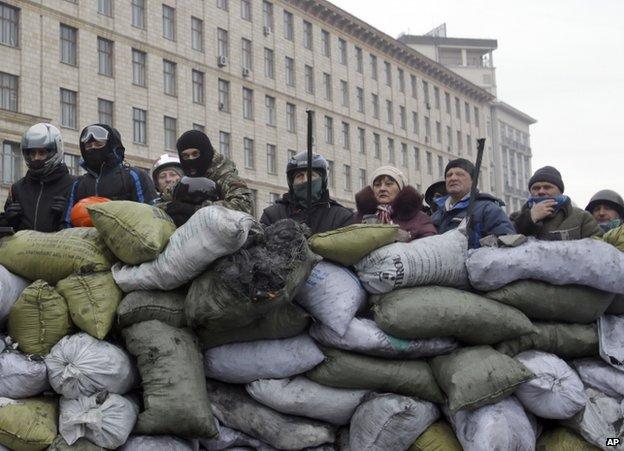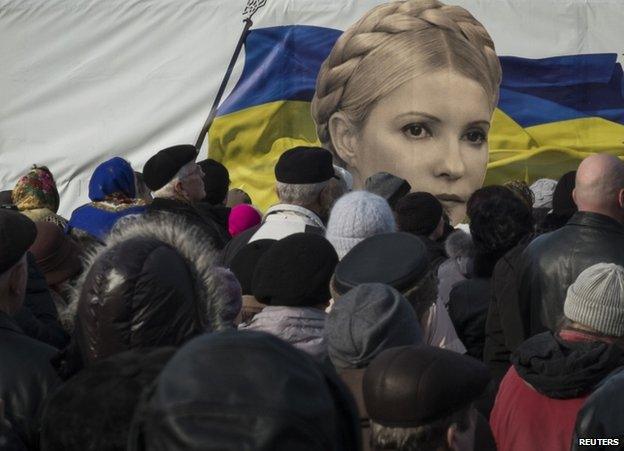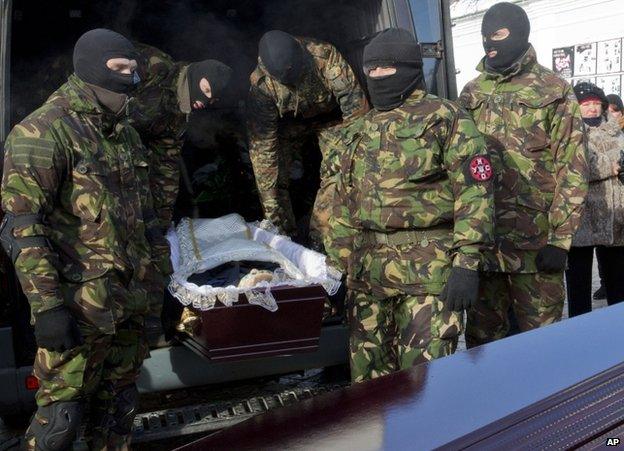Viewpoint: Ukrainian writer Andrey Kurkov on the protests
- Published

Protesters are entrenched behind barricades on Kiev's main square
Acclaimed Ukrainian novelist Andrey Kurkov has been witnessing events in Kiev at first hand. Here he gives his viewpoint on how they have radicalised his country.
In Russia and Ukraine they say "The way you greet the year is the way you will spend it". This New Year was celebrated by tens of thousands of Ukrainians on the Maidan [Independence Square in Kiev], among the canvas tents of the protest activists, drinking champagne and listening to Ukrainian rock musicians performing live on stage. Immediately after midnight, my brother and I took the five-minute walk from my flat down to the Maidan. The mood inside the barricades was cheerful and optimistic.
It is not like that any more. Now it is possible to look back on the last few weeks, and forward, realistically and, unfortunately, without too much optimism. Whatever the outcome of this revolution, neither side will be able to boast a total victory.
Ukraine is a country where victory for any one side is impossible. But now that, for the first time since independence 23 years ago, special forces police have clashed with demonstrators, leaving several people dead, hundreds wounded and hundreds in custody, Ukraine has shifted into a different category of country - from that of the peaceful and half-asleep to the category characterised by a highly radicalised population.
What is the source of this radicalism? It has sprung from an underlying and increasingly bitter realisation in many Ukrainians that none of the political parties represent their interests. Analysis of the 184 parties registered at the justice ministry would be a thankless task. It is enough to understand that some of the small parties can be bought reasonably cheaply and that in Ukraine, politics is about power and using that power to get rich.
The match thrown on to this smouldering mass of discontent was the introduction by President Viktor Yanukovych's government of radically authoritarian laws designed to crush peaceful, but determined, pro-European protests. Well. Nine out of 11 laws have now been abolished by an extraordinary session of parliament. Good that the president decided to choose talks, not tanks, at the last moment.
Back in December, the promise of early parliamentary elections could have calmed the protesters and encouraged them to disperse but President Yanukovych is not one to give in easily.
He would hang on till the end - and the end was approaching at speed. Now the demonstrators are demanding early presidential elections and a complete "rebooting" of political power.
Imprisoned leader

Supporters of Yulia Tymoshenko, defeated by Viktor Yanukovych at the 2010 election, are among the protesters turning out in Kiev
Mr Yanukovych will still not allow that since he fears he will be arrested and given the same treatment he gave former Prime Minister Yulia Tymoshenko. If a "reboot" were to take place, however, Tymoshenko would be released from prison and the three current opposition leaders would be eclipsed. Yulia Tymoshenko would become the only leader.
Those currently serving Mr Yanukovych would be arrested and put on trial. The judges would make decisions according to the desires of those in power. In other words, we would have more of the same, only it would look a great deal more elegant and would be sanctioned by half of the population. Ukrainians have never known the rule of law but an increasing number of people understand what it could be, and know it to be desirable.
A more likely scenario, until recently, seemed to be the introduction of martial law and the bloody crushing of demonstrations, followed by thousands of court cases. Tens of thousands of Ukrainians could find themselves in prison, but this would not bring stability.
Perhaps, if Ukraine did not have its western regions, with Lviv at the centre, it would be easy to turn the country into another Belarus. But Galichina and Bukovina, which became part of Soviet Ukraine under the Molotov-Ribbentrop Pact, brought to the country a rebellious and free spirit. A partisan war against the Soviet authorities continued for 15 years after World War Two, and during that time thousands of rebels and communists, KGB personnel and soldiers were killed.
During the past few days, demonstrators in the west of Ukraine have created an alternative regional parliament, which immediately voted to ban from its territory all activity by the Communist Party and the Party of Regions, the official ruling party. A peaceful transition of power back to Mr Yanukovych in western Ukraine is not possible any more. Any attempt to use military force would spark a new and even crueller partisan war.
Kremlin waits
The more I think about what has happened in Kiev over the last two weeks, the more it seems that the escalation of the conflict is in the interests of a third party.
The first fatality on European Square occurred on 22 January, the country's National Day of Unity and freedom. I was reminded of the assassination of Anna Politkovskaya (an outspoken critic of the Kremlin) on Russian President Vladimir Putin's birthday [7 October 2006].

One of those shot on 22 January, Belarusian citizen Mikhail Zhyznewski, was buried in Kiev on Sunday
Accusations that the Kremlin was behind attempts to split the country were already being sounded. No-one is in any doubt as to how concerned Russia is about Ukraine's future. Mr Putin, who quite publicly has no love for Mr Yanukovych, managed to snatch Ukraine out of the European Union's embrace, promising the country, which is on the edge of default, $15bn (11bn euros; £9bn) in credit. True, he has only given $3bn so far.
Now Russia is waiting to see how the situation will develop. During a secret sitting one day before announcing its resignation, the Ukrainian cabinet of ministers voted to increase the number of special forces by 600%. That will require money that the country does not have, but right now, avoiding a total boycott of the Sochi Winter Olympics is a higher priority for President Putin than Ukraine.
There is still a chance of a peace agreement between the leaders of the opposition and President Yanukovych, involving the formation of a new cabinet of ministers with more portfolios in the hands of the opposition and the promise of early presidential elections and constitutional reform.
Prime Minister Mykola Azarov has now resigned, and a new candidate must be found.
Petro Poroshenko, who has long political experience and regularly speaks to protesters from the Maidan's stage, is a possible candidate but would this satisfy the demonstrators? Many of them will consider anyone prepared to work under President Yanukovych as a traitor.
Today the Ukrainian parliament is working to find a way out of a stalemate, the responsibility for which lies not with the opposition, but with a government which is unloved in the west, in the south and in the east.
Andrey Kurkov is a Ukrainian writer, best known for the satirical 2001 novel Death and the Penguin.